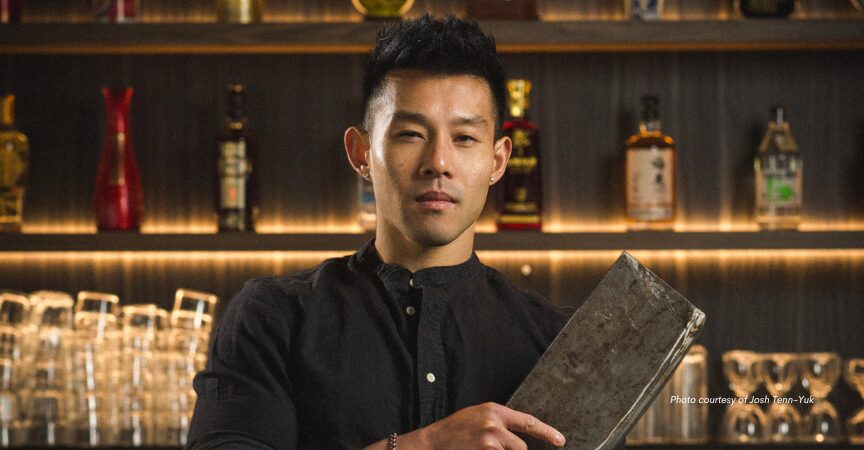Stirring Souls: The art of motivating staff and inspiring excellence
By: Chef Wallace Wong
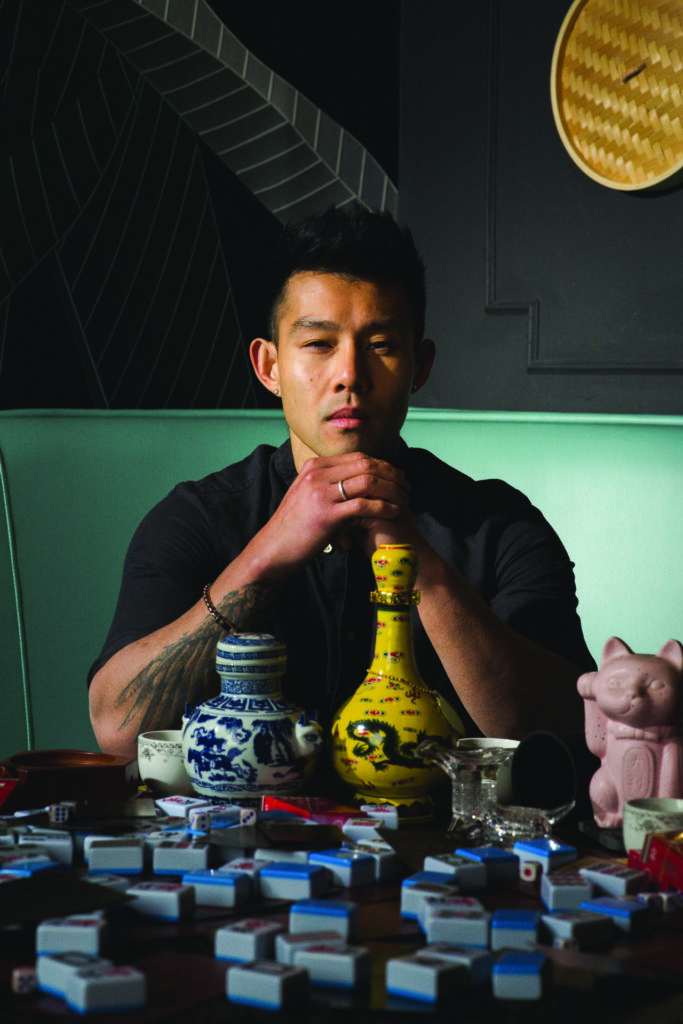
A genuinely motivated staff is the backbone of a successful restaurant, offering stability and efficiency in an environment where every team member’s contribution is crucial. Chef Wallace Wong believes that by empowering and recognizing employees, restaurateurs can foster a dedicated workforce that elevates the dining experience, encourages loyalty and drives the industry forward. Due to the yawning labour gap, this has never been so important.
Photo courtesy of Josh Tenn-Yuk
Leadership in the culinary world is often seen through the lens of hierarchy, with a focus on titles and positions from the executive chef down to the busboy. However, the essence of leadership in this industry, especially in restaurants, lies in the ability to rally a team towards a common goal; to create a cohesive unit that performs something magical together. This is crucial in an industry as challenging and cutthroat as ours, where margins are low, and success is hard-earned.
The COVID-19 pandemic taught us a lot about the resilience our field demands. It highlighted the importance of people and teams in navigating such tough times. Leadership is not just about holding a title; it’s about motivating and guiding your team, ensuring they feel valued and understand that they are doing, and that it’s about more than just cooking or serving. They are, in a way, like superheroes, enduring extreme conditions, handling dangerous equipment, and creating experiences and building memories that evoke deep emotions in people.
The current labour shortage in our industry is a complex issue. We can’t solely blame the industry or the people who choose not to work in it. With the plethora of choices available today, it’s understandable why someone might opt for a different path. That’s why it’s imperative that leaders find ways to make teams feel appreciated and inspired to be part of something bigger than just their daily tasks.
The true meaning of “motivation”
Motivating oneself is a personal journey, but igniting that spark in someone else is where the true art of leadership begins. Motivation thrives when it’s about more than just necessity, and all about provoking genuine desire. In the restaurant world, where the pressure is incessant, finding that trigger for each individual is key. Monetary incentives have their place, but often it’s the personal touches that resonate more deeply.
I worked in a restaurant where motivation was crafted not just through paychecks,
but through challenges and exclusive, but low-cost rewards. Picture standing for hours in a kitchen, immersed in a series of fast-paced, mundane tasks. There’s extreme cold, heat, whirring Vitamix machines. Our manager challenged us, offering us a case of an exclusive, house-brewed beer to whomever could get their work done fastest. It cost the restaurant nothing, but completly transformed the vibe and our attitude. This game not only infused fun into the routine but also catered to the interests of chefs who longed to taste and experiment.
Motivation is multifaceted, a kind of love language. While financial bonuses are important and appreciated, people also find profound satisfaction in heartfelt praise. It’s the understanding that every person has a different ‘why’; a unique driving force. It’s not about sticking to a one-size-fits-all solution, it’s about really seeing people and tailoring incentives to who they are and what they
care about. The rub is that this takes effort and time, commodities that can be in scarce supply in a busy and demanding kitchen.
It’s easy to get caught up in the relentless pace of a chef’s life, where more is accomplished in just three hours than many achieve in a full day. With such intensity, the focus can often shift to simply getting through the checklist—prepping the menu, managing inventories, planning events. It can be tempting to overlook the softer side of leadership; the personal connections, the life goals, the small talks about pets and dreams.
I recognize that elevating motivation above the day-to-day grind is not straightforward. It’s a challenge, especially when the culinary industry (and many others) traditionally looks to quick fixes like putting a name on a jacket or handing out an end-of-year bonus. Yet, there’s a wave of change, with restaurants now experimenting with four-day work weeks, allowing for a life beyond the kitchen walls—three full days for staff to indulge in personal passions, to recharge fully and to simply live.
This paradigm shift in work-life balance could well be the kind of motivation that redefines our industry, nurturing not just the skills of our teams but their spirits too. Because when the white coats come off, our chefs, cooks and staff are individuals with dreams and aspirations that extend far beyond the kitchen’s heat and hustle.
Ultimately, leadership in the culinary world is about balancing the execution of everyday tasks with creating an environment where every day is an opportunity for someone to have the best time of their life. It’s about instilling the belief that if you love what you do, you’ll never work a day in your life.
Tailoring opportunities for each person that intersect with their personality may not feel like a priority, but if you’re always focused on putting out the little, day-to-day fires, overlooking the needs of your team can create bigger fires in the long run. And you can’t address those larger issues without your team. No matter what, people are the food industry’s greatest asset, and protecting that asset is central to running a successful operation.
I think that structure and and the system we all work within has flaws. It’s “just kind of been this way” for so many years—look at the success of The Bear. Chefs and cooks are actually getting PTSD from that show and don’t want to watch it, and people are making memes and talking online about how their industry friends don’t want to watch it because it’s too real.
The pressures of cooking – the adrenaline the endorphins—if you love it, you love it.
It’s a thrill and a rush. I’m currently doing my own thing, and I miss that, but I don’t miss many of the other things around that. Now, as a creator, when I go out to a restaurant opening or go out to eat, I try to showcase and share as much as I can of that place and of the people who produce that experience. I may not even know the chef, but I’ll find their Instagram and tag them because I know they’re in the back killing it and may never get the recognition they need and deserve.
Everybody wants to be wanted. Everybody wants to be valued. Everybody wants to be loved and showcased right? No matter who you are as a person. Even if you’re the most introverted person, you crave that.
When I used to work on the line, my motivation was, “How can I get the rest of my team to feel more lively? I made a miso pasta one time and, instead of writing “Miso Pasta” on the bags, I wrote “Miso (Hungry)”. When the chef came in he said, “What the f***? Wallace—you’re such a loser,” and he laughed. It’s the little things we all do that make it better. I think sometimes the industry is looking for huge solutions, which make it a huge task and then it only happens once a year. But, imagine your significant other only said, “I love you” once a year?
It’s a misconception that motivation requires grand gestures. Sometimes, the most profound shifts come from simple, creative acts that break the monotony and ease pressure. The industry seems to think we need to develop huge programs to inspire people, but the truth is, daily ‘I love yous’ mean more than grandiose annual gestures. It’s why initiatives like weekly basketball games or social initiatives are so impactful; they foster community and promote wellbeing, not just in theory,
but in practice.
The true power of motivation lies in personal touches—gifting a pair of coveted shoes or tickets to a game can mean more than a hefty bonus. These acts show that we see our people, understand them, and appreciate their efforts. And in an industry where our job is to bring joy to others, we must not forget the happiness of our own teams.
The irony is that we work in an industry based on making people happy, but we often don’t know how to do the same for our own.
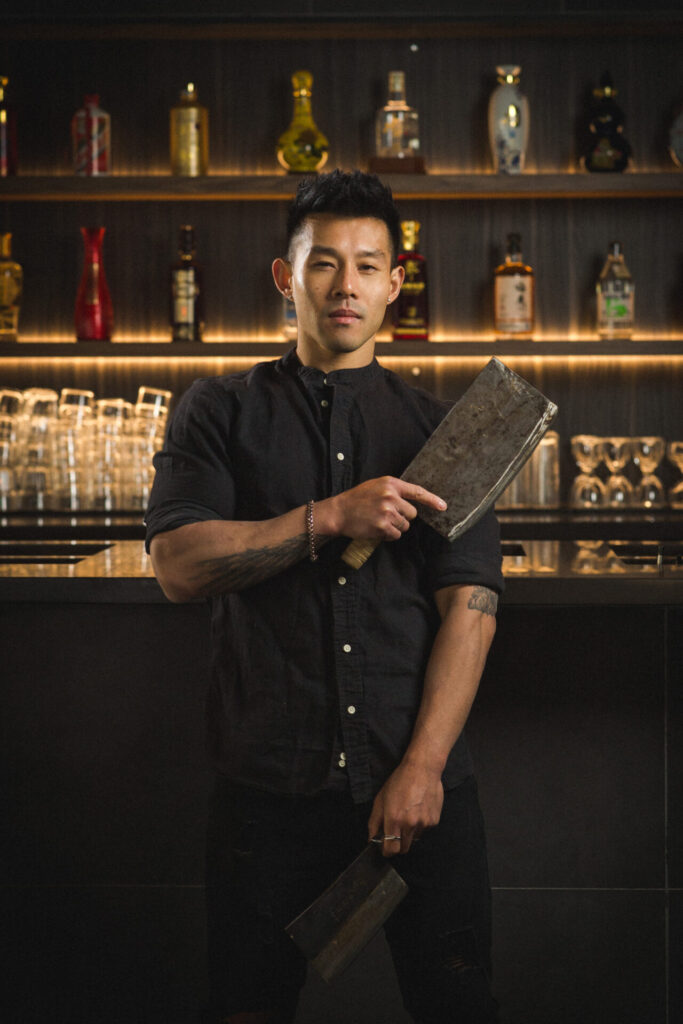
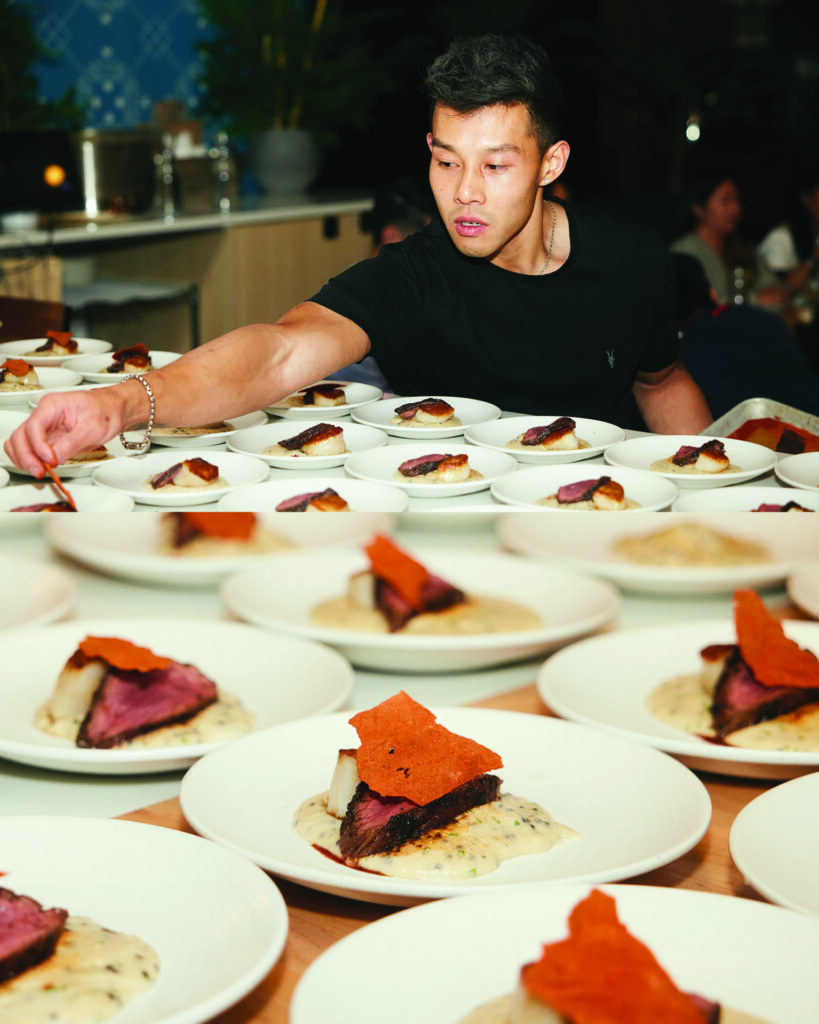
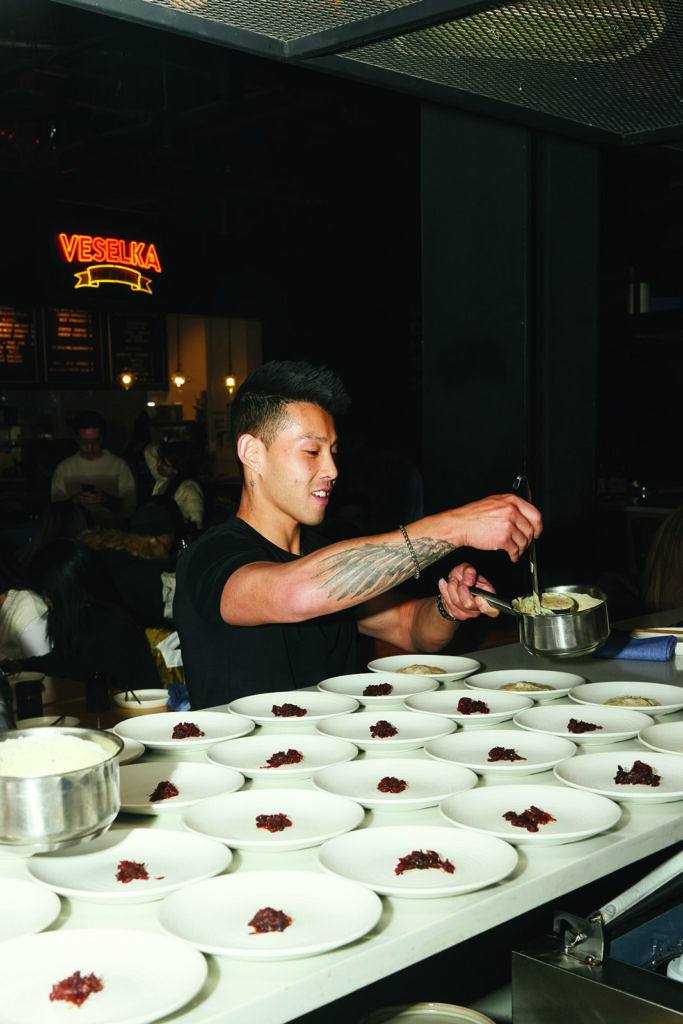
On setting goals and planting seeds
For me, it’s always been about setting goals. I got motivated during my battle with cancer. Grasping the concept of ‘no tomorrow’ triggers a profound shift in perspective—one that I share often, hoping others learn from my experience without having to go through it themselves. Knowing the fragility of life motivates me to embrace each day fully and, while I’m not saying that my life is always filled with sunshine and rainbows, I do ask myself, “If today were my last, would this bump or hurdle really matter? Like, if I’m going to die tomorrow, do I really want to waste 30 minutes being upset when I could have spent it outside or having a drink with a friend? It’s all about very small things. I think that’s my biggest motivation and why I feel like I’m invincible—I can do anything in the world because I’ve learned the value of life.
For example, when I started building my career as a creator, I wanted to understand what the greater foodservice industry was doing. I went to RC Show as an exhibitor and a volunteer. I met a lot of people and had some great conversations for a couple of years until, once Six Pack Chef took off, I was offered the opportunity to participate in a panel discussion on entrepreneurship in the industry. This year, I’m on the Culinary Stage doing a knife skills masterclass. It’s all about having goals and patience. I just plant the seeds, and plant them in very purposeful, meaningful ways, with people you can connect with and build a long-term relationship.
That awareness fuels me, maintaining my gratitude even on the toughest days. It keeps me grounded and hopeful. When asked how I am, I can truly say I’m doing better than most, and yet, there’s always room to be better. That is the essence of my drive and I think leaders should approach their life and business the same way. This is your chosen profession. Wouldn’t you want to run your establishment every day as if it was your last, putting out your absolute best service and having the best imaginable time doing it?
That should be like the motivation for every day because everybody wins. Your customer has the ultimate experience, so they spend more and tip better, then they tell everyone they know about your place. Your front of house team is not fielding complaints because your back of house is cooking like it’s the last day of their life and they’re making everything beautiful and perfect and having a great time.
When we all think differently, we flourish. We build an environment where people feel that if they weren’t going to be on this earth tomorrow, they’d be happy because they’re doing what they love with people they care about.Work should (and can) feel like you’re on a great date. The one where you wish you didn’t have to go home, and you find every single excuse to stay and prolong that experience.
About Wallace Wong
Chef Wallace Wong, also known as the Six Pack Chef, is a professional chef, fitness athlete, TV personality, entrepreneur and Guinness World Record holder. He has worked in prestigious restaurants worldwide, including Langdon Hall, NOMA, Alinea, and Momofuku Shoto. Wallace is recognized from TV shows like Fridge Wars, Top Chef Canada, Chopped Canada, and Bake it Possible. Labeled clinically obese as a child, Wallace transformed himself into an international fitness competitor, and has competed on bodybuilding stages like the Arnold Amateur. As a cancer survivor, Wallace is passionate about living life to the fullest and shares his expertise in food, health and fitness through his TikTok and Instagram platforms, with viral content, a “What’s Cooking” IGTV series and a G.O.A.T. Masterclass.
sixpackchef.com | Instagram and Tik Tok — @w2sixpackchef



